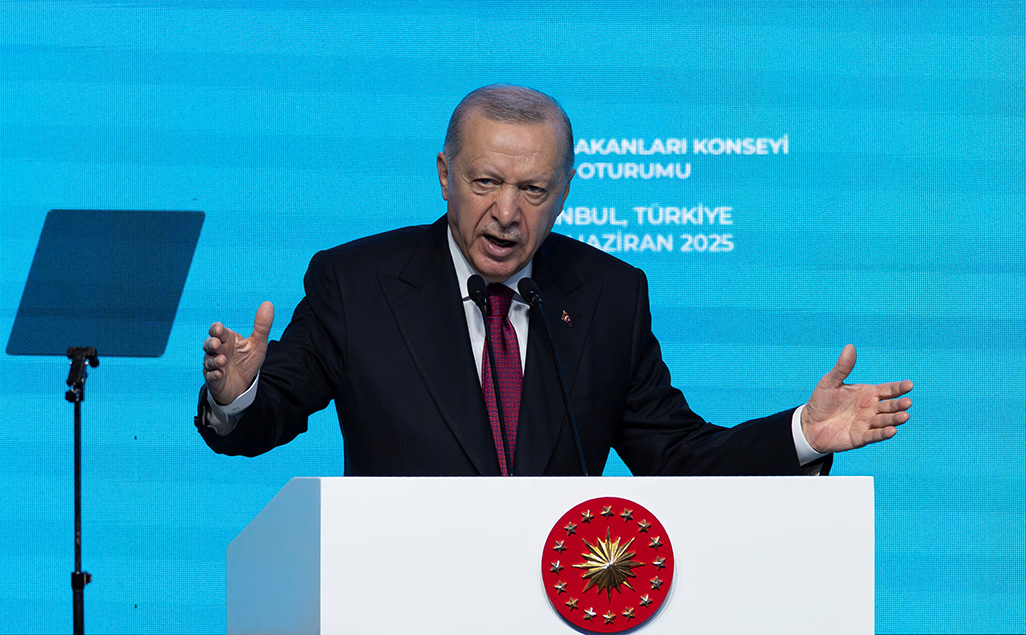President Tayyip Erdogan risks losing support among nationalist Turkish voters in making peace with Kurdistan Workers Party militants, whose burning of weapons last week was dismissed by some as a stunt.
A backlash to Erdogan’s call on Saturday for wide parliamentary support for the process underlines the challenge he faces in balancing nationalist and Kurdish demands, with a failure to do so potentially jeopardising the plan’s success.
Erdogan’s own future is also at stake: his term runs out in 2028 unless parliament backs the idea of early elections or a change in the constitution to extend a 22-year rule in which he has raised NATO member Turkey’s profile on the world stage. He insists that personal political considerations play no role.
“The doors of a new powerful Turkey have been flung wide open,” he said on Saturday of the symbolic initial handover of arms.
While his AKP party’s far-right nationalist coalition partner MHP drove the peace process, smaller nationalist parties have condemned it. They recalled his years condemning the pro-Kurdish DEM party as being tied to the 40-year PKK insurgency that the PKK now says is over.
Erdogan’s comments about “walking together” with DEM drew a cool response from the pro-Kurdish party itself, with DEM lawmaker Pervin Buldan saying there was no broad political alliance between it and the AKP.
AKP spokesperson Omer Celik reaffirmed the president’s nationalist credentials in response to a request for comment on his statement, saying the process “is not give-and-take, negotiation, or bargaining.”
Parliament is convening a commission tasked with deciding how to address Kurdish demands for more autonomy and the reintegration of fighters complying with the February disarmament call of jailed PKK leader Abdullah Ocalan.
The nationalist opposition IYI Party is refusing to take part, with its leader Musavat Dervisoglu describing the peace process at the weekend as a betrayal after a conflict which has killed more than 40,000 people.
“We will not allow the Republic to be destroyed, we will not allow the Turkish homeland to be divided, we will not surrender to betrayal,” he said.
Umit Ozdag, head of the opposition Victory Party, also sought to stir nationalist passions, slamming the commission as a bid to legitimise the PKK and dismissing the event where 30 PKK members burned their guns as a “barbecue party”.
“You don’t just burn 30 rifles and call it a day. Weapons are surrendered, and PKK members interrogated one-by-one.”
A senior Turkish official said the gun burning was an “irreversible turning point”. It is part of a five-stage process culminating in legal reforms and social reconciliation by early 2026, according to another Turkish source.
NUMBER CRUNCHING
While those parties could not derail the peace process alone, Erdogan, a shrewed political operator, is likely to closely monitor public reaction as the commission starts its work.
A private June survey by the Konda pollster seen by Reuters showed that only 12% of respondents believe the PKK, designated as a terrorist group by Turkey and its Western allies, has abandoned the insurgency that it launched in 1984.
It also showed potential candidates for the opposition CHP, now subject to a wide-ranging legal crackdown, beating Erdogan in head-to-head votes in an election.
Erdogan critics say the peace process is aimed at drawing Kurdish support for a new constitution that would both boost their rights and allow him to be a candidate in 2028. He says reform is needed because the constitution is outdated rather than for any personal reasons and he has not committed to running again.
It is unclear whether the commission will propose constitutional change, but such changes require the support of 400 MPs in the 600-seat assembly with the potential for a referendum if more than 360 MPs vote in favour. The AKP-MHP alliance has 319 seats, while DEM have 56.
Any move to hold early elections would also require 360 votes, but that – and the peace process itself – would depend on keeping DEM on board.
After meeting the justice minister on Wednesday, DEM’s Buldan said she had insisted that PKK disarmament proceed in lock-step with legal changes.
“The minister expressed commitment to ensuring the process proceeds legally and constitutionally,” she said, adding that there was no specific timeline for disarmament.






Click here to change your cookie preferences